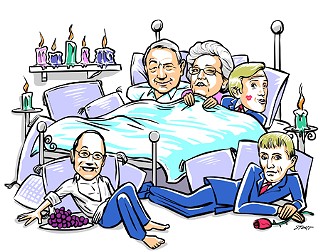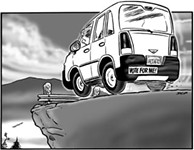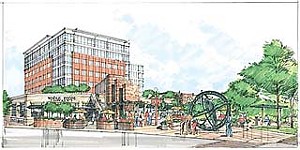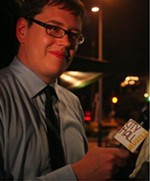Lee & Carole & Brewster & All of Us ...
Consider the possibilities this election day
By Wells Dunbar, Fri., May 1, 2009
Contrary to what many of us are raised to believe, the mayor isn't the be-all and end-all of local politics. In Austin, Hizzoner or Heroner doesn't even have much traction on an ordinary, lowly City Council member. The mayor needs a council majority to get anything done; there's no fast lane to expedite the mayor's ideas and initiatives. Really, all the mayor gets is a cushier office, an extra staffer or two, and the bully pulpit to push an agenda. And depending on your view of the five candidates currently vying for the center seat and the gavel at council meetings, the institutional brakes on their powers are either a blessing or a curse.
Some of the candidates have proposed progressive, high tech visions for the future; others eye gathering economic danger and say they'll help us ride out the storm. Yet another has demonstrated she'll do anything – including cooking stats and contorting reality – to reclaim the office she once held.
So before this election day, Saturday, May 9 (if you haven't eagerly voted already), here's a look at where the candidates come down on the issues most directly affecting Austin.
Jobs and Economy: A Difference in Focus
To combat the recession locally, Brewster McCracken has proposed Austin embrace high tech, growth industries such as renewable energy, digital media, biotechnology, health care, and more. "You'll need at least one big bedrock sector to replace what's happening in the semiconductor sector," he says. "Clean energy is looking like that sector globally. ... Solar and energy storage in particular are looking like the biggest manufacturing-base sector so that people of all skill levels can take part in it." To that end, he's energetically promoting the Pecan Street Project, a "clean energy research and development partnership" dedicated to developing "smart grid" technology with city-owned Austin Energy and several other players. Seeking to contrast this high tech industry with its gasping predecessors, he describes utilities as well as health care and entertainment as less cyclical than consumer-driver computer tech and therefore more resistant to recession. On the stump, he's described himself as a stronger champion of renewable energy than Lee Leffingwell, depicting his own proposals as a way out of the downturn and his opponent's central promise to "focus on the fundamentals" as no better than "hunkering down" – a phrase destined to dwell in local political infamy, alongside "forgivable loan" and "Hi, this is your neighbor Lisa."
"Actually, nobody really knows what that term means," Leffingwell reckons on "hunker." But as he sees it, "we want to be ready to deal with the fiscal problems that we're gonna have, and we have to be ready ... to maintain our basic core city services during hard times." (Last week's grim budget preview for the coming year served to reinforce that prognosis.) He adds, that "in no way precludes any of the other growth options" on the table, like attracting employers in fields such as renewable energy. But in emphasis, Leffingwell instead has chosen to focus on small, local businesses. "Over 70 percent of the people in the Austin area work for what could arguably be called small businesses, employers with less than 100 employees. ... That's where we should be focusing a lot of attention," he says. To that end, he's proposed creating a small-businesses cabinet, staffed by – who else? – small-business leaders; expanding support services; and looking at creating a "local preferences" distinction at City Council: steering more city contracts to local businesses and offering local firms the chance to rebid if they're within 10% of the winning low bid.
Former Mayor Carole Keeton Strayhorn's economic emphasis has been on recruiting volunteer business task forces – the traditional good ol' boys or their sons and daughters – for expertise on entrepreneurship. When she talks about particular industries, she emphasizes biotechnology and renewable energy, as well as film and new media. She says she plans to create city-sponsored "innovation incentive" programs to provide "boost-ups for growing businesses, not bail-outs for failing businesses." (Whatever the subject, Strayhorn is big on alliteration.) And she sees her promotion of a new medical school for Austin as promoting both health care and the local economy, although she tends to glide over the question of state funding: "I could raise the funds right here in Austin," she told the press last month.
City Budget: Where's the Cutting Edge?
The biggest budgeting dispute between Leffingwell and McCracken has been over city salaries. "About 80 percent-plus of the entire city budget are wages and benefits," says McCracken. "If we had everybody not take a pay raise, and maybe even a little bit of a cut ... that might be a way to maintain city services, and everybody could share in the sacrifice, including myself." A popular topic of McCracken's has been public-safety costs, which consume some 65% of the city budget; he's repeatedly called for renegotiating planned police raises unless the economy improves. "It's time to [tell] the public-safety unions ... 'We can't do a pay raise, guys; you need to come to the table and share in the salary sacrifice.'" The public-safety unions themselves – which endorsed Leffingwell – have not been happy at McCracken's charge that they haven't been willing to share budgetary sacrifices. In response to McCracken's suggestion to that effect in the KXAN/LBJ School debate last week, the heads of the three unions (police, fire, EMS) issued a joint statement objecting to McCracken's statements and insisting that "if salary cuts for all City employees ever do become necessary in the future, we will sit down with [city officials] to discuss how Police, Fire, and EMS employees can be part of the solution to the city's budgeting challenges."
Leffingwell's response on this issue has been to point out that in 2003 McCracken supported the public-safety premium, a provision in police contracts that guaranteed an additional 2% bump above any raises granted to all city employees; having driven up personnel costs in the years since, the premium is missed about as much as former Austin Police Department Chief Stan Knee's mustache. McCracken, conceding he voted for the contract as the council's most "junior member" in 2003, counters that in 2005, "I was actually the first council member to say we can't do the premiums anymore."
Speaking more broadly on public-safety issues, both candidates are generally satisfied with Police Chief Art Acevedo's performance – McCracken approves Acevedo's willingness to consistently discipline his officers, and Leffingwell praises the chief's openness – but neither supports APD's recent vampiric foray into forced blood draws on DUI suspects who refuse Breathalyzers, a controversial program that Acevedo defends under current state law.
As potential cuts loom with the new budget, Leffingwell says: "I don't want to try to apply uniform cuts across the board, although I think that would be the politically expedient thing to do, the safe thing to do, and the easy thing to do. ... I think the responsible thing to do is to take a look at prioritizing our city services and making a determination about what we absolutely have to have and what we can do without."
Strayhorn also opposes across-the-board cuts and blasted the city's recent major renewable-energy purchases – in biomass and solar – as wasteful and ill-considered, even saying she will do what she can to break the contracts. (Shudderingly, Strayhorn also says she supports a change to a "strong mayor" government instead of the current council-manager structure, and she often campaigns as though the change has already been made, and she's running for CEO.) In addition to denouncing the city's spending on "lobbyists" – the team of experts representing the city at the Legislature – she says she will cut "from the top down, not the bottom up," particularly from the mayor and council's office funding. She persists in claiming that the city budget is "$137 million" in deficit by simply refusing to acknowledge the enterprise funding provided by the city-owned Austin Energy and Austin Water Utility. As we reported when she first made this claim, "for anyone – much less the former state comptroller – to stoke fears about a $137 million shortfall in the midst of dire financial times is ignorant at best and irresponsible at worst." In the formally nonpartisan city system, Strayhorn may not be running as a Republican – but she hasn't abandoned her GOP-style attack strategy.
Affordability and Neighborhoods: Quality of City Life
On affordability, there's not much difference between the two council members. In one candidate questionnaire, Leffingwell says the city needs to promote affordable housing – in part to combat suburban sprawl – "through the judicious use of the 2006 affordable housing bond funding," an initiative the council firmly supported. He also has promoted the city's efforts to make portions of East Austin a Homestead Preservation District, implementing optional tax-increment financing there in order to buy down rising property taxes. McCracken points to the affordability requirements in the vertical mixed-use ordinance he saw through on council – an effort designed to promote density along heavily traveled thoroughfares – but will say it's too early to assess as successful in terms of affordability. "The real proof tends to be five years out," he said, adding, "All of us on the council ... really have embraced density versus sprawl as the way to go."
Both council members also supported the council's affordable-housing goals along transit-oriented developments and the creation of density bonuses requiring affordable housing in larger projects – a move council contrarians say inadvertently shrinks affordable stock by allowing dense development only with strings attached. More generally, detractors call these half-steps toward addressing a full-fledged affordability crisis.
To address neighborhood issues, McCracken has called for the next regularly scheduled bond election in 2012 to revolve around neighborhood needs and desires: sidewalks, pocket parks, soccer fields, and the like. "Instead of three big bond projects, we should do 300 little projects," he writes on his website, using quality-of-life improvements in neighborhood plans as a guide. Leffingwell elucidated several positions at the Austin Neighborhoods Council endorsement meeting. Asked to name instances when he "supported the neighborhood position over developer interests," he cited zoning skirmishes in the Heritage neighborhood, Barton Hills, Oak Hill, and South Lamar "as they went through their VMU process. ... On virtually all the neighborhood plans, I have taken the position that, 'Let's get mutual agreement on [any specific] VMU before we proceed with that.' ... There's plenty of VMU in place that will keep all the builders busy as long as we need to."
Strayhorn has had little to say either on affordability questions or the involvement of the neighborhoods either in their own planning or the city's comprehensive plan. That may be because neither issue was prominent when she last served on council or because neither is readily susceptible to simple slogans. On affordability, she appears to believe that reducing city expenditures will inevitably lead to more affordable city living (e.g., by lowering taxes), and she has called for forums on public issues outside City Hall. (In the same vein, Leffingwell has promised to hold some council meetings around the city.)
Transportation: How Do We Get There From Here?
Detractors have noted McCracken's relative silence on transportation this election – specifically on light rail, for which he was a passionate advocate less than a year ago. (His 2008 early enthusiasm – declaring rail was then ready for a November election, before funding mechanisms had been developed – was reined in by Mayor Will Wynn and Sen. Kirk Watson and then was partially blamed, probably unfairly, for the plan's demise.) McCracken insists he's still a proponent: "I'm still the only candidate in this election who will tell you this: I support light rail," he says, adding he'd work to procure federal funding. However, he's opposed to an interim 2010 bond election focused on transportation – which Leffingwell has directly called for. "We're the most congested midsize city in the United States, and we need to do something about it sooner rather than later," says Leffingwell, envisioning a bond election trained on transportation infrastructure – roads, sidewalks, bike lanes – and a rail referendum. Citing comparatively lower costs of construction and materials, he says, "During a down economy would be the absolute right time to do something like this."
McCracken currently serves on the Capital Metro board of directors, a position Leffingwell held before Mike Martinez took his place. McCracken has a slightly rosier view of the agency than his opponent, saying there was "a wholesale change in the financial team at Capital Metro a little over a year ago" and that "the previous team was not doing its job. ... It's kind of like blaming the Obama administration for this recession. They inherited it; they didn't create it." He calls the delay in the rail launch a learning-curve flub for the agency's first rail project and points to recent improvements there (including a long-delayed fare increase and a peer review by other transit agencies). By contrast, Leffingwell says Capital Metro is "an agency in trouble" and has called for CEO Fred Gilliam to step down, hoping his departure could smooth tattered relations between labor and management. He also supports an audit of Capital Metro and says that Strayhorn, who has sensationalized the agency's financial troubles as a campaign issue, was asked repeatedly as state comptroller to audit the agency but never did.
Strayhorn has leaped upon recent negative Cap Metro headlines to denounce her opponents for not doing enough on transit – although it's plain that by transit, she means highways. "Deficit spending while we're stuck in traffic?" complains her latest TV commercial. "Not on my watch!" Like much of Strayhorn's campaign rhetoric, it's a pure non sequitur, pitched to pooh-poohing suburbanites who simultaneously abhor high taxes, toll roads, and traffic jams – and Strayhorn doesn't bother to address how to pay for golden highways.
Buttross and Ingalls: The Also-Rans
As we enter the last week of campaigning, it seems unlikely that any of the Big Three will garner a majority in the first round. That's partly because three nonincumbents on an election match is difficult arithmetic in itself and partly because two additional minor candidates also decided to run for the council's most prominent seat, likely to pull another few percentage points from the general vote. While David Buttross and Josiah Ingalls are miles apart in campaign style and pet issues, they closely share one trait: Neither has made any visible effort to find out exactly how city government works.
Buttross is a local businessman (Buttross Realty) who calls himself a "liberal libertarian" and promises to bring "business-style" solutions to City Hall. A self-described millionaire from real estate deals across Texas, Buttross credits himself with "turning renters into homeowners" (i.e., he sold them houses) and also with some vaguely described, quasi-charitable ventures involving low-rent nursing homes and nonprofit organizations. (Indeed, judging from remarks he's made on the stump, difficulties with city permitting over some of these real estate deals appear to have at least in part motivated his mayoral run.)
On economic and budgetary matters, the Buttross mantra has been "It's Easy!" He'll "scrub the budget" (of programs generally unspecified) and forego his own mayoral salary (not a terribly big bite to the projected deficit). His specific proposals are slim and somewhat mini-Strayhorn: Focus on fundamentals like roads and public safety, cut the lobbyists, and address affordability by means of "public-private partnerships." (He also has said he'll work to get the Resource Center for the Homeless, aka the ARCH, moved out of Downtown.) Buttross says the city should consider rejecting federal stimulus dollars and specifically lauds Gov. Rick Perry's decision to reject federal unemployment-insurance funds because they come "with strings attached."
Ingalls is a hotel houseman whose expressed motivation for running is to give voice to those he considers neglected Austin citizens. In video blogs (www.youtube.com/josiahingalls), he shares the forces that shaped his candidacy; as he titled his unpublished poetic autobiography, My Mother Did It, So Now I Am the Man That I Am. What his mother did, according to Ingalls, was deny him an education by poorly homeschooling him. He now advocates for homeschooling standards, having declared himself president of the School for All Children Act, although it's hard to say what the org consists of other than its minimal website.
He has offered little in the way of proposals to address lower-income needs and on the stump awkwardly echoes what he hears from the other candidates. (For example, he says there should be no cuts in the public-safety budget, although that's the greatest city expense, making it difficult by contrast to address social-service needs.) Ingalls says he once lived on the streets and therefore makes combating homelessness a major tenet of his campaign, but he hasn't proposed any specific solutions other than expanding social services and promising not to move the ARCH out of Downtown.
Note: This story features material from the Hustle for Mayor, a series of video interviews the Chronicle conducted with all the candidates who agreed to be interviewed. See the full interviews at austinchronicle.com/hustle.
Got something to say on the subject? Send a letter to the editor.











